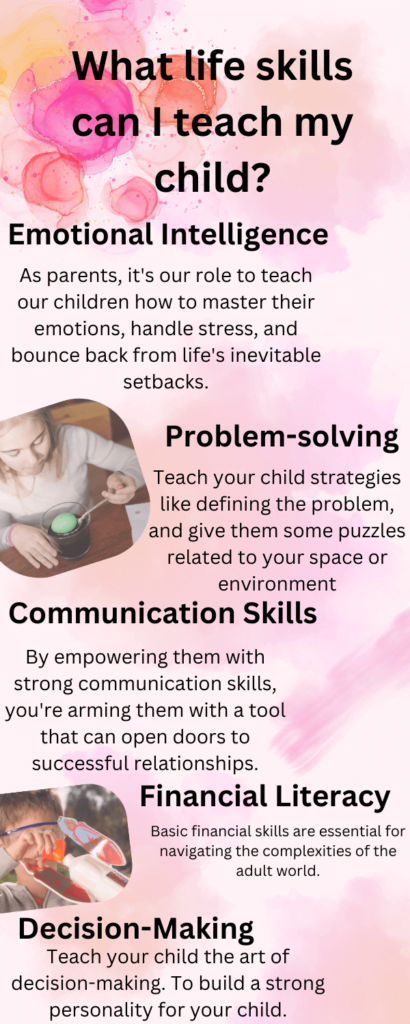Table of Contents
Life skills are those valuable lessons a parent should teach their child from the beginning. Most parents hold a profound responsibility to guide their children through the educational labyrinth and to equip them with the essential life skills that will empower them to navigate the complexities of adulthood. But, nowadays, when the world is moving so fast, parents should also stay vigilant and equip their children with academics. Academic achievements are undoubtedly crucial. They are only one facet of the multifaceted journey our children embark upon. The question often arises: “What life skills can I teach my child?” In this blog, we will share the treasury of life skills you can devotedly impart to your child from their earliest years.
Communication Skills
We all must have been aware of the importance of effective communication, it is not just a skill; it’s a keystone of achievements in personal and professional domains. As parents, nurturing this skill in our children should be on top. Motivate your child to articulate their thoughts and feelings clearly. Help them understand that active listening is equally important; it fosters empathy and respect for others.
Emotional Intelligence
Emotional intelligence, referred to as EQ, is a pivotal life skill that can profoundly influence your child’s personal and professional journey. “It centers on the capacity to skillfully identify, comprehend, control, and steer one’s emotions, fostering emotional intelligence for a more fulfilling life”. As parents, it’s our role to teach our children how to master their emotions, handle stress, and bounce back from life’s inevitable setbacks.
- Recognizing Emotions: Encourage your child to identify and label their emotions. By understanding what they’re feeling, they can better manage their responses.
- Understanding Emotions: Teach your child that emotions are natural responses to situations. Help them understand that it’s okay to feel a wide range of emotions and that these feelings provide valuable information.
- Managing Emotions: Guide your child in finding healthy ways to express and manage their emotions. It may include deep breathing exercises, journaling, or sharing their feelings.
- Coping with Stress: Equip your child with stress-management techniques such as mindfulness, relaxation exercises, or engaging in hobbies they enjoy.
- Building Resilience: Teach your child that setbacks and failures are part of life. Motivate them to view challenges as opportunities for growth and learning.
Emotionally intelligent individuals tend to have healthier relationships, exhibit greater empathy, and excel in their personal and professional lives. By nurturing emotional intelligence in your child, you are providing them with valuable life skills that will serve them well throughout their journey toward adulthood and beyond.

Problem-solving and Critical Thinking
Problem-solving is one of those life skills that every field of life has always emphasized because when you master the art of problem solutions, you become unbeatable. Teach your child strategies like defining the problem, and give them some puzzles related to your space or environment so they can brainstorm solutions, evaluate options, implement plans, and monitor progress. These steps provide a structured approach to overcoming obstacles and finding creative solutions.
Developing Critical Thinking Skills: Sharpening the Mind’s Edge
Critical thinking empowers your child to analyze information, distinguish facts from opinions, and make informed decisions. Motivate them to question sources, engage in logical reasoning activities, and recognize biases in the data. These skills foster independent and thoughtful decision-making.
Real-Life Application: From Theory to Practice
From theory to practice is the real test of problem-solving and critical thinking when it lies in their real-world application. Guide your child in applying these skills to everyday situations, such as resolving conflicts with friends, making choices about their education, and addressing challenges at home. Emphasize the importance of learning from mistakes and setbacks as valuable growth opportunities.
Time Management
Time management is a skill that can significantly impact one’s productivity and success. The best way to teach your child time management is leading by example; kids unconsciously notice the behavior of their parents and adopt that as a parent, you have to put in some extra work, and when you start to plan your day include your child in this practice write all the task with desired time limit according to the priority of that tasks, set goals, and manage their time efficiently show them to do the same and when the task is complete collectively put a check on it. It will help them handle responsibilities effectively as they grow.
Financial Literacy
Basic financial skills are essential for navigating the complexities of the adult world. Teach your child about budgeting; buy them a money box to save a certain amount every day or after a week. Teach them to save before spending, and when you go out for errands; ask them to buy some valuable item with their saved money. These practices will help them understand the value of money and will lay a strong foundation for their financial future.
Responsibility and Accountability
Instill a sense of responsibility in your child by assigning age-appropriate chores and tasks. Every weekend, do some home tasks together where you can demonstrate this practice to your child. Teach them the importance of keeping commitments and being accountable for their actions. Responsibility and accountability build character and reliability.
Conflict Resolution
Conflict is a natural part of life, and teaching your child how to resolve conflicts constructively is invaluable. Motivate them to find peaceful solutions, communicate openly, and compromise when necessary.
Empathy and Kindness
Promote empathy and kindness by setting a positive example and encouraging generosity. Help your child understand the importance of treating others with respect and compassion.
Decision-Making: among the powerful life Skills
Teach your child the art of decision-making. To build a strong personality for your child, you have to give them control over making their own decisions, parents like to control their child forever, but it is their right of freedom of choice. Your job as a parent is to guide them, teach them, discuss the consequences of choices, involve them in decision-making processes, and demonstrate the results so they will be aware of making informed decisions that align with their values.

Adaptability and Resilience
Life is full of unexpected twists and turns. To help your child develop adaptability and resilience by exposing them to new experiences, encouraging them to embrace change, and teaching them how to bounce back from setbacks.
Conclusion
As we conclude our exploration into the question of “What life skills can I teach my child?” it becomes evident that the journey of parenthood is about nurturing academic excellence and fostering essential life skills that will shape our children into confident, capable individuals.
